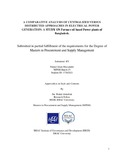A comparative analysis of centralized versus distributed approaches in electrical power generation: a study on furnace oil based power plants of Bangladesh

View/
Date
2017-07Publisher
BARC UniversityAuthor
Mazumder, Fukrul IslamMetadata
Show full item recordAbstract
Organizations with centralized power generation have a single facility to generation and
transmission their generated electricity with multiple grid substations in their supply chain. A
single power plant can dramatically reduce per unit production costs by using the same
equipment to produce electricity, allowing the company to achieve economies of scale. Research
from the nonprofit organization PENDEKER Energy shows that centralized power generation
organizations have generation costs that are about 3 percent lower than decentralized
organizations. For an organization with $5 billion in annual revenue, this is a difference of $150
million. PENDEKER energy research also shows that raw material inventory turn rates and
generation schedule efficiency are higher in organizations with centralized power generation.
Centralized power generation can also enable better forecasting, more local jobs, consistent
production and more effective use of limited resources. The cost of materials may also be lower
for centralized generation sites that are located near the source of those materials.
Organizations with decentralized power generation enjoy many benefits that often elude
companies with centralized plants. These advantages include flexibility, being closer to their
customers, better and timelier information, more motivated managers and employees, and the
ability to take advantage of low labor costs in different areas. When a company is physically
close to its customers, it can be more flexible in meeting increasingly diverse demands. Greater
flexibility means greater customization. Decentralized power generation not only improves the
efficiency of decision-making but also empowers employees, letting them improve problem
areas immediately without approval from a centralized organization. According to a study by
Harvard University, decentralized production actually increases motivation and creativity by
giving lower tier managers more responsibilities. When a manager is given a sense of ownership
over an operation, efficiency increases among employees in both production and support
positions.
Decentralized power generation has disadvantages as well. Multiple sites require a larger
investment of capital to set up, the per-unit costs are higher than mass-produced generation made
in a central plant, and maintaining organization-wide consistency in products and processes is a
challenge.
